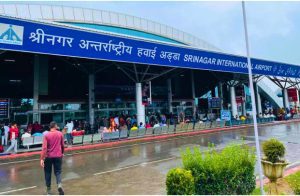New Delhi – In the immediate aftermath of India’s Operation Sindoor—a series of precision strikes targeting nine terrorist facilities in Pakistan and Pakistan-occupied Kashmir—major airlines have announced temporary closures of several airports across northern India. The Airports Closed After Operation Sindoor include key transportation hubs in border states, significantly impacting domestic and international air travel schedules.
SpiceJet, Air India, and IndiGo have all issued travel advisories informing passengers about these closures and recommending that travelers check their flight status before heading to the airport. These precautionary measures have been implemented to ensure passenger safety amid evolving security concerns in India’s northern airspace.
Complete List of Airports Closed After Operation Sindoor
The following airports have been confirmed closed until further notice:

- Dharamshala Airport (DHM)
- Leh Airport (IXL)
- Jammu Airport (IXJ)
- Srinagar Airport (SXR)
- Amritsar Airport (ATQ)
- Chandigarh Airport


These closures primarily affect airports in the northern states of Jammu and Kashmir, Ladakh, Punjab, and Himachal Pradesh—regions that share proximity to the Pakistan border. The Airports Closed After Operation Sindoor represent critical connectivity points for these regions, and their temporary shutdown will significantly affect travelers and businesses alike.
Additional Flight Destinations Impacted
Beyond the complete airport closures, several other destinations are experiencing significant flight disruptions without full airport shutdowns. According to Air India’s advisory, flights to and from the following destinations are affected until at least 12 noon on May 7, 2025:
- Rajkot
- Bhuj
- Jamnagar
- Bikaner
These destinations, primarily in Gujarat and Rajasthan, are also experiencing disruptions due to airspace restrictions implemented in the wake of Operation Sindoor. The Airports Closed After Operation Sindoor and these additional affected destinations form a security perimeter along India’s western border.
Airline-Specific Advisories and Responses
Air India’s Response to Airports Closed After Operation Sindoor
Air India was among the first carriers to issue a comprehensive advisory regarding the situation. Through their official social media channels, they announced:
“In view of the prevailing situation, Air India has cancelled all its flights to and from the following stations – Jammu, Srinagar, Leh, Jodhpur, Amritsar, Bhuj, Jamnagar, Chandigarh and Rajkot – till 12 noon on 7 May, pending further updates from authorities. Two international flights en route to Amritsar are being diverted to Delhi. We regret the inconvenience caused due to this unforeseen disruption.”
The national carrier has been proactively managing the situation, with particular attention to international flights affected by the Airports Closed After Operation Sindoor. Their announcement about diverting international flights bound for Amritsar to Delhi demonstrates the cascading impact these closures have on international air traffic.
IndiGo Airlines’ Advisory
IndiGo, India’s largest airline by market share, also issued a flight advisory through their social media platforms. Their initial announcement mentioned that flights to and from Srinagar, Jammu, Amritsar, Leh, Chandigarh, and Dharamshala would be impacted due to the Airports Closed After Operation Sindoor.
In a subsequent update, IndiGo expanded their advisory to include Bikaner: “Update: Flights to/from Bikaner are also impacted by the current airspace restrictions. We request you to check your flight status before reaching the airport.”
SpiceJet and Other Carriers
SpiceJet similarly issued advisories about the Airports Closed After Operation Sindoor, urging passengers to monitor flight statuses closely. Other domestic and international carriers operating in the affected regions have followed suit, implementing contingency plans to manage disrupted flight schedules.
Impact on Travelers and Alternative Arrangements
The sudden announcement of Airports Closed After Operation Sindoor has left many travelers scrambling to make alternative arrangements. Passengers with bookings to or from the affected airports are facing cancellations, delays, and diversions, disrupting travel plans across the board.
Airlines are offering various options for affected passengers, including:
- Full refunds for cancelled flights
- Rebooking on alternative dates without additional charges
- Rerouting through unaffected airports where feasible
Travelers are advised to contact their respective airlines directly to discuss available options. The Airports Closed After Operation Sindoor situation remains fluid, with airlines promising to provide updates as they receive more information from authorities.
Security Measures Behind Airport Closures
The decision to implement Airports Closed After Operation Sindoor stems from standard security protocols following military operations. Such closures serve multiple purposes:
- Ensuring civilian aircraft are not at risk in case of any retaliatory actions
- Freeing up airspace for potential military operations
- Implementing enhanced security screening at transportation hubs
- Allowing for reassessment of air traffic routes in sensitive regions
Aviation security experts note that the Airports Closed After Operation Sindoor represent a precautionary approach rather than a response to specific threats. These measures are consistent with international best practices for civilian aviation safety during periods of heightened military activity.
Economic Impact of Airport Closures
The Airports Closed After Operation Sindoor will have significant economic implications, particularly for the tourism and business sectors in the affected regions. Destinations like Leh, Srinagar, and Dharamshala are popular tourism hubs, and the timing of these closures—coming during the peak summer tourism season—will affect local businesses dependent on visitor traffic.
Similarly, commercial centers like Amritsar and Chandigarh will experience disruptions to business travel and cargo operations. The extended impact of Airports Closed After Operation Sindoor will depend largely on how long these restrictions remain in place and whether they expand to include additional transportation infrastructure.
Previous Instances of Airport Closures During Security Operations
This is not the first time India has implemented Airports Closed After Operation Sindoor-like measures. Similar closures occurred in February 2019 following the Balakot airstrikes, when airports in northern India were temporarily shut down as a precautionary measure.
During that period, airports in Jammu, Srinagar, Leh, Pathankot, Amritsar, Shimla, Kangra, Kullu Manali, and Pithoragarh were closed for civilian traffic. The current Airports Closed After Operation Sindoor follows a similar pattern, though the specific airports affected differ slightly based on the current security assessment.
Expected Timeline for Resumption of Services
While most airlines have indicated that the Airports Closed After Operation Sindoor situation will continue at least until noon on May 7, 2025, aviation authorities have not provided a definitive timeline for when normal operations might resume.
The duration of these closures will depend on several factors:
- The overall security situation following Operation Sindoor
- Any diplomatic or military developments between India and Pakistan
- Assessments by India’s civil aviation authority and defense establishment
- Weather and visibility conditions in the affected regions
Passengers with travel plans involving these airports in the coming days are advised to maintain close contact with their airlines and prepare for potential extended disruptions beyond the initial advisory period.
Closing Remarks: Navigating Air Travel During the Airports Closed After Operation Sindoor Period


As the situation continues to evolve, passengers should prioritize staying informed about the status of Airports Closed After Operation Sindoor. Official airline communication channels, including social media accounts, mobile apps, and websites, will provide the most current information regarding flight cancellations, diversions, and resumption of services.
Travel insurance providers are likely to consider these closures as extraordinary circumstances, potentially affecting coverage for related expenses. Travelers should review their policies and contact insurance providers for clarification on coverage during this period.
The Airports Closed After Operation Sindoor represent a significant but necessary disruption to ensure public safety. As authorities continue to monitor the situation, more updates are expected in the coming hours and days regarding when normal air travel operations might resume across northern India.

